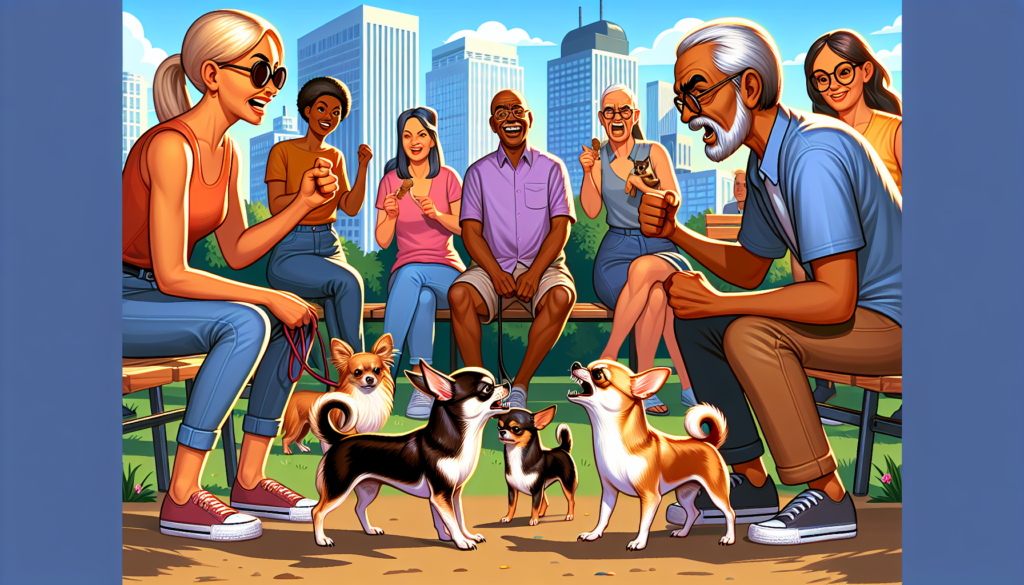Who hasn’t run into an aggressive Chihuahua? Picture this: you’re enjoying a peaceful walk in the park when a pint-sized creature races towards you, baring minuscule teeth, and giving you an earful of shrill barks. Yes, we are talking about the smallest members of the canine world, the Chihuahua. They are the ones carrying the reputation of being aggressive, but there’s so much more to them.
Contrary to popular belief, Chihuahuas aren’t born mean or aggressive. As a passionate dog owner and diligent puppy blogger, my research over the years has enlightened me on the factors leading to
Do you want to know more about reasons why are Chihuahuas so aggressive? Then use the table of contents below to jump to the most relevant section. And you can always go back by clicking on the black arrow in the right bottom corner of the page. Also, please note that some of the links in this article may be affiliate links. For more details, check the Disclosure section at the bottom of the page.
Here's what we'll cover:
Aggressive Behavior in Chihuahuas
Spoiler alert: small size may play a part, but it’s not the sole reason.
Is a Chihuahua one of the most aggressive dogs?
While it is true that Chihuahuas may snap, growl, and even bite more than other breeds, labeling them as “the most aggressive dog” is not completely fair. Their aggressive behavior is not an intrinsic part of the Chihuahua breed but is often a result of specific factors like lack of socialization, fear, anxiety, or certain triggers. Like many misunderstood breeds, Chihuahuas get a bad rap, but really, they’re just trying to navigate their World-Chihuahua-sized.
Factors Contributing to Chihuahua Aggression
One key reason why chihuahuas are often seen as aggressive is their small size. The world is a big and scary place for such a little creature. Anything larger than a Chihuahua – which, let’s be honest, that’s just about everything – can potentially be a threat. This perceived vulnerability can lead to defensive aggression in an attempt to protect themselves.
Impact of Lack of Training and Socialization
Lack of training and socialization is another reason why Chihuahuas may become aggressive. It’s essential to socialize your Chihuahua from a young age. Exposing them to different environments, situations, people and other animals helps your puppy grow into an understanding and tolerant dog. Not doing so could lead to fear-induced aggression when faced with unfamiliar circumstances.
Triggers for Aggressive Behavior in Chihuahuas
Chihuahuas, like any other breed, can have triggers that evoke aggressive behaviour. It could be a certain sound, the UPS guy, or even a specific type of dog hat. Identifying and understanding these triggers can go a long way in managing a Chihuahua’s aggression.
Stress and Anxiety in Small Dogs
Chihuahuas, owing to their small size, are more prone to stress and anxiety, which can contribute to aggressive behavior. Remember, a nervous Chihuahua is more likely to bite than a content one. While it may touch our hearts to comfort and coddle these tiny pups, it’s critical to help them feel secure and safe without reinforcing their fears. Looking after a Chihuahua or any other small dog is all about understanding and responding to their unique needs and personalities. By providing training, socialization, and care tailored to their size and psyche, even Chihuahuas can be, well, as gentle as a puppy.
Dealing with Fearful or Stressed Chihuahuas
It’s no secret that Chihuahuas have a reputation for being a bit edgy. When they feel threatened or stressed, they may bark, growl, or show other signs of stress. These pint-sized pups, due to their tiny dog stature, are often more susceptible to fear or anxiety, which can trigger this behavior. As a dog owner, understanding this behavioral shift and how to best navigate it can make a substantial difference in your pup’s overall disposition.
Role of Genetic and Breed Traits
Breed traits play a significant part in picturing why Chihuahuas often display aggressive behavior. From their ancestry, including the parents, these smaller dogs were bred for alertness and quick response, which can sometimes be misconstrued as aggression towards both dogs and people. Just like every dog, Chihuahuas have a distinct temperament that may not be instantly obvious to all pet owners. Their genetic imprinting makes them territorial, observant, and occasionally snappy, especially when they feel cornered. Aggressive Behavior in Chihuahuas Chihuahuas are known for their feisty attitude. Although their bark is significantly louder than their bite, these fiery furballs don’t hesitate to stand up for themselves, even when faced with dogs many times their size. This bravery combined with a need to act protective towards their owners can manifest as aggression. Aggression in a Chihuahua usually centers around possessiveness, fear-induced actions, or territorial disputes.
Effective Training and Socialization for Chihuahuas
Training and socialization are building blocks to a well-behaved Chihuahua. A study showed that dogs from a shelter were medium to high aggression scores, but those dogs made a significant mental adjustment and offered calm authority during training. Introducing your Chihuahua to a variety of people, environments, and other dogs from an early age can help curb their aggressive tendencies. It’s not just about teaching commands; it’s about expanding their worldview and lessening the fear of the unknown.
Positive Reinforcement Training for Chihuahuas
Using positive reinforcement in training your Chihuahua is a proven method for reducing aggression and fearfulness. Treats, praises, and toys should be handed out generously when your dog exhibits positive behavior. This approach encourages your dog to repeat desired actions and behaviors. Gently correcting undesirable ones is also worth noting. The goal is to reward good behavior rather than punish bad behavior, which often leads to fear and further aggression.
Socializing Your Chihuahua with Other Dogs
Proper socialization is a critical aspect of dog ownership, particularly with breeds known for their uneasiness around unfamiliar dogs or people. Allow your Chihuahua to interact with other pets under your supervision, starting with smaller and calmer dogs. Seeing you calm and relaxed around other dogs teaches them that there’s no threat, thus slowly reducing their protective instinct.
Leash Training and Behavior Correction
By nature, Chihuahuas are explorers and can sometimes forget their diminutive size. Leash training is essential to keep your pup safe, particularly in public areas. When they try to charge or bark at another dog or a person, a gentle tug on the leash and a firm “No” helps them understand that such behavior is unacceptable. Remember, it’s about correction and not punishment. In due time, your tiny dog will understand what is expected of them and show a marked improvement in their behavior.

Reducing Aggressive Tendencies through Training
As a chihuahua mom, I’m all about helping my furry little pals unfold their big personalities into well-balanced charms. I’ve learned that reducing aggressive tendencies in chihuahuas, especially feisty ones, can be achieved through consistent obedience training. As I was reading the ‘American Kennel Club’ guidelines on dog training, I noticed a segment specifically for smaller breeds. Larger dogs could possibly get away with less stringent obedience commands, but our chihuahuas, with their tiny bodies and enormous energy, definitely need a structure to their day. I’ve made a mental adjustment to this training and it fixed the problem immediately. Mind you, my little Roberto is a bit spoiled but he deserves it, after all, a dog’s life is relatively short and as my funny companion, he makes me smile every day.
Behavior Modification for Chihuahuas
Chihuahuas are adorable, but they’re also known to have rather fierce traits if not guided properly. Dealing with a grumpy chihuahua or even a chihuahua-terrier mix need not be challenging if we understand that at their core, they are perhaps just a little, well… fearful. Recognizing the root cause of their aggression – be it stress and anxiety or a dislike for larger dogs – is the first step toward modifying their behaviors. Behavior modification, like moving house or introducing them to puppy classes, can help your chihuahua gain confidence and get over their fear. Remember, a fearful chihuahua isn’t a bad dog, he or she is a dog that requires understanding, patience, and a safe space to grow into their personality.
Seeking Help for Aggressive Chihuahuas
If you’ve noticed behavior changes that appear hostile or out of the norm in your chihuahua, your best bet isn’t to turn into little panicked parents. Instead, it’s worthwhile to seek professional help. I remember a week or so I noticed a peculiar behavior in my chihuahua, and when I called in an expert, it turned out he was suffering from separation anxiety. It was heartbreaking to realize that our furry friend had been living with such stress, but being aware, we could treat it better.
Professional Dog Training for Chihuahuas
The American Kennel Club emphasizes professional dog training, especially early in your Chihuahua’s life. Having the right training right from puppyhood can prevent behaviors that can be both harmful to themselves and others. But it’s never late. I’ve had my share of training my adult rescued Chihuahua, and though it was a bit of a challenge, in time he was responding positively to command cues. Remember, the aim is not to bare your authority, but to help them understand boundaries and live a secure and happy dog life. Investing in a professional dog training not only helped my Chihuahua but also strengthened our bond.
Consulting a Veterinarian for Aggression Issues
If your Chihuahua’s aggression seems to be constant, it’s advisable to reach out to a veterinarian. Starting with ruling out any physical ailments like genetic disorder can cause instability, it’s crucial to ensure nothing is physically amiss. In rare cases, some aggression could be a result of health issues. The veterinarian may also suggest changes in diet or even recommend a therapist to deal with behavioral issues. After all, environmental factors and personality trait play a large role in how our chihuahuas behave.
Thanks for the blog graphics: Canva.com
Doghint.com is a participant of several affiliate programs. The list includes (but not limited to) the following: VigLink, Refersion, ShareASale, and Amazon Services LLC Associates Program, an affiliate advertising program designed to provide a mean for us to earn fees by linking to Amazon.com and affiliated sites. Doghint.com does not intend to provide veterinary advice. All published articles are meant for informational purposes only and not substitute the professional veterinary consultation.


